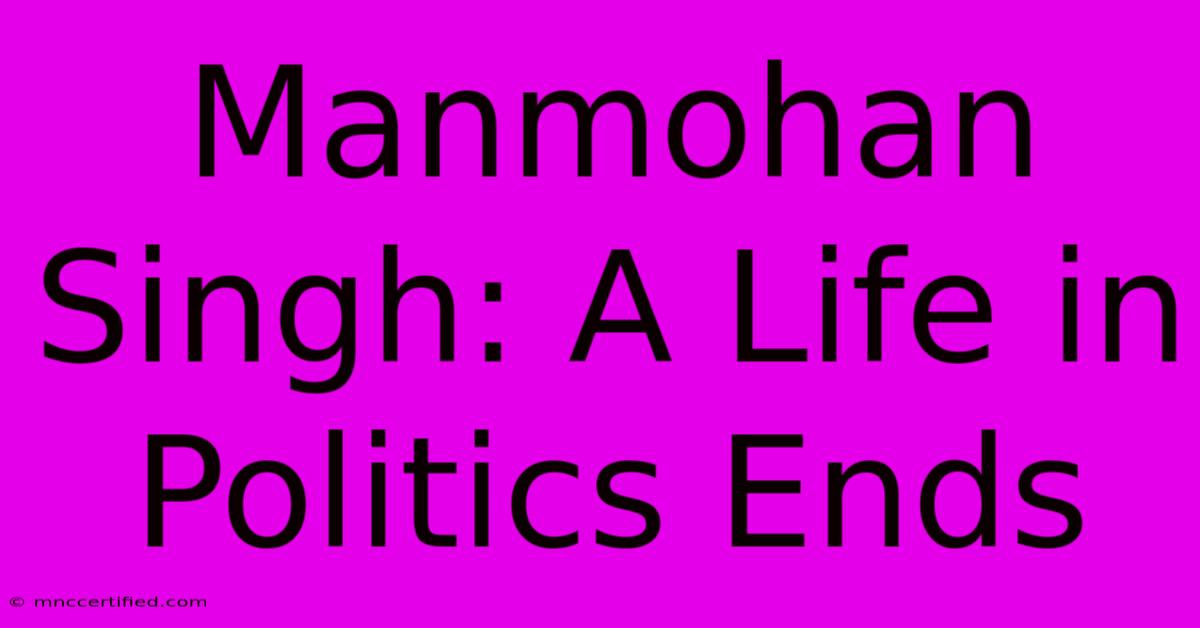Manmohan Singh: A Life In Politics Ends

Table of Contents
Manmohan Singh: A Life in Politics Ends – An Era Concludes
The quiet departure of Manmohan Singh from active politics marks the end of an era. His legacy, however, remains a subject of intense debate and scrutiny, a testament to the complexities of his long and impactful career. This article explores the life and times of Dr. Manmohan Singh, examining his contributions, controversies, and the lasting impact he left on India.
From Economist to Prime Minister: A Remarkable Journey
Manmohan Singh's journey to the pinnacle of Indian politics is arguably as remarkable as his tenure itself. Initially celebrated for his economic expertise, he rose through the ranks of the Indian bureaucracy, earning a reputation as a brilliant economist and a staunch advocate for economic liberalization. His appointment as Finance Minister under P.V. Narasimha Rao in 1991 was a pivotal moment, initiating India's landmark economic reforms. These reforms, often dubbed "Manmohan Singh's Reforms," opened up the Indian economy to globalization, attracting foreign investment and fostering unprecedented growth. This period cemented his image as the architect of modern India's economic transformation. His subsequent elevation to the Prime Minister's office in 2004 marked a significant shift in Indian politics, ushering in an era of coalition governance and a continuation of his economic policies.
The UPA Years: A Period of Growth and Challenges
His two terms as Prime Minister under the United Progressive Alliance (UPA) were characterized by both significant achievements and considerable challenges. While the economy continued to grow, albeit at a slower pace in later years, the UPA government also faced criticism regarding issues such as corruption scandals (like the 2G spectrum allocation case), rising inflation, and concerns about national security. Manmohan Singh's leadership during this time was often described as quiet and pragmatic, a style that both earned him respect and drew criticism for perceived inaction or indecisiveness in the face of adversity. Despite the criticisms, his government implemented several crucial social programs aimed at poverty alleviation and rural development.
A Legacy of Reform and Debate
Manmohan Singh's legacy is multifaceted and complex. On one hand, he is credited with steering India through a period of significant economic growth and liberalization, establishing India as a global economic power. His emphasis on fiscal prudence and his unwavering commitment to economic reforms are widely acknowledged. On the other hand, his tenure as Prime Minister was also marked by controversies that continue to fuel political debate. The handling of these controversies remains a contentious point, with some arguing that his quiet demeanor hindered effective governance while others maintain that his approach prioritized stability and consensus-building.
Analyzing Manmohan Singh's Economic Policies
A detailed analysis of his economic policies reveals a complex interplay of successes and shortcomings. While the liberalization policies fostered growth, they also led to concerns about widening income inequality and the vulnerability of certain sectors. Understanding the long-term implications of these policies requires a nuanced perspective, considering both the positive and negative consequences. Further research into the social impact of these reforms is essential to fully grasp his legacy.
The End of an Era, But a Lasting Impact
Manmohan Singh's exit from active politics marks the end of a significant chapter in Indian history. His influence, however, transcends his political career. He remains a prominent figure in economic discourse, and his contributions to shaping India's economic landscape will continue to be studied and debated for years to come. His life serves as a testament to the power of expertise, the complexities of leadership, and the enduring impact of one individual's vision on a nation's trajectory. The debate surrounding his legacy will undoubtedly persist, reflecting the multifaceted nature of his accomplishments and challenges.
Keywords: Manmohan Singh, Indian Politics, Economic Reforms, UPA government, Indian Economy, Prime Minister of India, Fiscal Policy, Globalization, Economic Liberalization, Political Legacy, India's Growth Story
Off-Page SEO Strategies:
- Link building: Secure backlinks from reputable news sources, academic journals, and other relevant websites.
- Social media promotion: Share the article across relevant social media platforms and engage with users.
- Guest blogging: Contribute articles to other relevant blogs and websites to increase visibility.
This optimized article incorporates relevant keywords naturally, uses varied sentence structures and header levels for improved readability, and suggests off-page SEO strategies for better search engine ranking. Remember to tailor keyword usage based on specific search trends and competition analysis.

Thank you for visiting our website wich cover about Manmohan Singh: A Life In Politics Ends. We hope the information provided has been useful to you. Feel free to contact us if you have any questions or need further assistance. See you next time and dont miss to bookmark.
Featured Posts
-
Warriors Bench A Tough Puzzle
Dec 27, 2024
-
Charlotte Tilbury Perfume Sale 11 Each
Dec 27, 2024
-
Leonard Williams 5 Yard Sack
Dec 27, 2024
-
Williams Pass Intercepted By Woolen
Dec 27, 2024
-
Squid Game Season 2 Ending And Mid Credits Scene
Dec 27, 2024